The State of California has taken another leap to support electric vehicle owners and manufacturers. On August 27th, the California Public Utilities Commission formally approved a plan from investor-owned utility Southern California Edison (SCE) to fund approximately 37,800 electric vehicle charging ports within its service territory. Under the program, known as Charge Ready 2, SCE will install and maintain the charging infrastructure, while program participants will own, operate and maintain qualified charging stations. SCE will also provide rebates to lower the cost of program participation, including an expanded rebate program to support EV charging ports in new multifamily dwellings under construction.
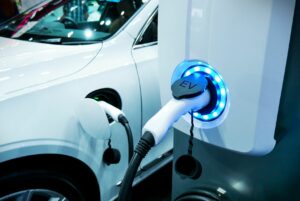
Of the $436-million-dollar budget, $417.5 million will fund the charging infrastructure for Level 1, Level 2, and direct current fast chargers, while the remaining funds will be used for marketing, education, outreach, and evaluation programs. The utility, which provides power to 15 million people across 50,000-square miles of Southern California, has committed to install 50% of these chargers in disadvantaged communities that are often disproportionately impacted by air pollution.
This program expands the Charge Ready Pilot program, which began three years ago, and joins SCE’s Charge Ready Transport, which aims to provide charging to support 8,490 medium- and heavy-duty electric vehicles over the next five years.
The Charge Ready 2 program will benefit current owners of electric vehicles by increasing charging options and possibly enhancing the market for used electric vehicles, making electric vehicles a more affordable option for more consumers. The program will also encourage the purchase of new electric vehicles, which will benefit not only consumers wanting to own an EV, but also manufacturers who must meet their required percentage of zero emission vehicle sales. Under California law, which has also been adopted by several other states under the federal Clean Air Act, manufacturers must produce enough zero emission vehicles to meet the minimum credit requirement, which increases by 2.5% annually. For example, for model year 2020 vehicles, a manufacturer must produce enough zero emission vehicles to have credits equal to 9.5% of the manufacturer’s average fleet sales in model years 2016-2018.
Not only has the global pandemic spawned a race to develop a cure for COVID-19, it has also created a race to the Patent Office to protect the massive investments companies are making in their attempts to develop novel diagnostics, therapies, and vaccines to combat the disease. In the United States, the first inventor to file a patent application that teaches a new and non-obvious way to treat the virus or its effects will be eligible for the limited monopoly that a patent provides. As has been reported, researchers are employing a variety of different mechanisms to attack the virus and it is expected that a significant number of patents will ultimately issue from these efforts.
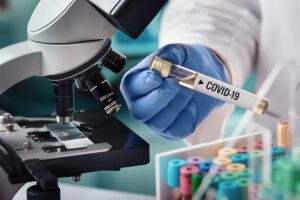 While Big Pharma is well-poised to incur the expense of patent filing, including the additional expense of paying for accelerated examination of their applications, smaller concerns may not be in a position to do so. To help small businesses and solo inventors in this regard, the United States Patent Office has announced a program that would fast-track the examination of certain patent applications related to the pandemic. While the typical turn-around time for an Examiner to provide an initial review of a new application is about two years after filing, payment of an extra fee to accelerate examination is also an option. Small businesses and startup companies, however, typically can’t take advantage of this program due to the substantial increased initial cost. To remove this impediment, the new program enables business with less than 500 employees to request accelerated examination of certain COVID-19-related applications with no additional upfront payment. If an application qualifies for the program, the Patent Office promises to fully examine it within a year of being granted prioritized status.
While Big Pharma is well-poised to incur the expense of patent filing, including the additional expense of paying for accelerated examination of their applications, smaller concerns may not be in a position to do so. To help small businesses and solo inventors in this regard, the United States Patent Office has announced a program that would fast-track the examination of certain patent applications related to the pandemic. While the typical turn-around time for an Examiner to provide an initial review of a new application is about two years after filing, payment of an extra fee to accelerate examination is also an option. Small businesses and startup companies, however, typically can’t take advantage of this program due to the substantial increased initial cost. To remove this impediment, the new program enables business with less than 500 employees to request accelerated examination of certain COVID-19-related applications with no additional upfront payment. If an application qualifies for the program, the Patent Office promises to fully examine it within a year of being granted prioritized status.
The program is further limited to therapeutics, vaccines and diagnostic tests that are subject to FDA approval for COVID-19 related uses. FDA approvals include, for example, Investigational New Drug (IND) applications, Investigational Device Exemptions (IDE), New Drug Applications (NDA), Biologics License Applications (BLA), Pre-market Approvals (PMA), and Emergency Use Authorizations (EUA).
As of Thursday, August 20th, there have been 274 applicants with 146 requests having been granted. The program is limited to the first 500 approved applicants.
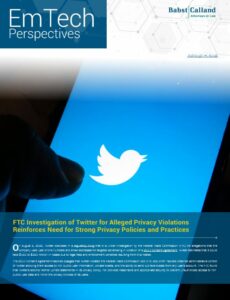 On August 3, 2020, Twitter disclosed in a regulatory filing that it is under investigation by the Federal Trade Commission (FTC) for allegations that the company used user phone numbers and email addresses for targeted advertising in violation of a 2011 Consent Agreement. Twitter estimates that it could face $150 to $250 million in losses due to legal fees and enforcement penalties resulting from this matter.
On August 3, 2020, Twitter disclosed in a regulatory filing that it is under investigation by the Federal Trade Commission (FTC) for allegations that the company used user phone numbers and email addresses for targeted advertising in violation of a 2011 Consent Agreement. Twitter estimates that it could face $150 to $250 million in losses due to legal fees and enforcement penalties resulting from this matter.
The 2011 Consent Agreement resolved charges that Twitter violated the Federal Trade Commission Act (FTC Act) when hackers obtained administrative control of Twitter allowing them access to non-public user information, private tweets, and the ability to send out fake tweets from any user’s account. The FTC found that Twitter’s actions neither upheld statements in its privacy policy, nor provided reasonable and appropriate security to prevent unauthorized access to nonpublic user data and honor the privacy choices of its users.
Read more.
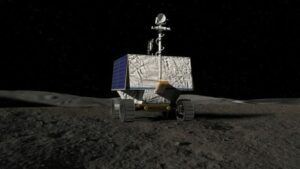
An artist’s rendering of NASA’s VIPER rover, which will roam the Moon’s south pole looking for water ice.
(Source: NASA)
Today, we are thrilled to celebrate with Astrobotic Technology, Inc., a Pittsburgh-based space robotics and lunar transportation and logistics company, on receiving a $199.5 NASA award to send the NASA Volatiles Investigating Polar Exploration Rover (VIPER) to the lunar surface in 2023 to search for water-ice. Not only is this a historically significant mission, as it is the first “resource-mapping” mission of its kind, this is an amazing achievement for a company that that has worked tirelessly for 13 years to prove a new commercial space market. For more information, click here.
Our Emerging Technologies attorneys are fortunate to work with incredible innovators, entrepreneurs and visionaries pushing the frontiers of technology and industry. We love to showcase our clients, especially when they hit notable milestones that may be of interest to our entire Babst Calland EmTech family.
Our newly launched EmTech Blog will enable us to do more of these Client Spotlights, so stay tuned! If you would like your company to be featured, please send accomplishments or highlights to jkasznica@babstcalland.com.
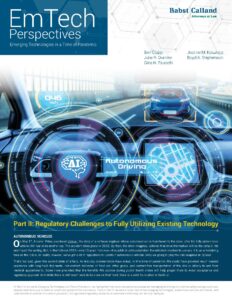 Regulatory Challenges to Fully Utilizing Existing Technology
Regulatory Challenges to Fully Utilizing Existing Technology
On May 1st, Amazon Prime premiered Upload, the story of a software engineer whose consciousness is transferred to the cloud after his fully autonomous vehicle (AV) rear-ends another car. The accident takes place in 2033. By then, the show imagines, vehicles that drive themselves will be the default. We won’t spoil the ending. But, in the fictional 2033 only 13 years from now—the public is astounded when the vehicle is involved in a wreck. It is an entertaining take on the future. In reality, however, we’ve got a lot of regulations to update if autonomous vehicles (AVs) are going to play the role imagined in Upload.
Read More.
Tags: Autonomous Vehicles,
Coronavirus,
COVID-19,
Drones,
Efficiency,
Emerging Technology,
Industry News,
Innovation,
Mobility,
Pandemic,
Robotics,
Tech Industry,
Technology,
Transportation
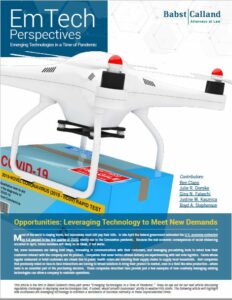
Opportunities: Leveraging Technology to Meet New Demands
Most of the world is staying home, but businesses must still pay their bills. In late April the federal government estimated the U.S. economy contracted by 4.8 percent in the first quarter of 2020, mostly due to the Coronavirus pandemic. Because the real economic consequences of social distancing occurred in April, future numbers will likely be as bleak, if not worse.
Yet, some businesses are taking bold steps, innovating in communications with their customers, and leveraging pre-existing tools to retool how their customers interact with the company and its product. Companies that never before offered delivery are experimenting with last mile logistics. Farms whose regular restaurant or hotel customers are closed due to public health orders are retooling their supply chains to supply local households. And companies that previously relied on face-to-face interactions are turning to virtual solutions to bring their product to market, even in a field like wine production—where taste is an essential part of the purchasing decision. These companies described here provide just a few examples of how creatively leveraging existing technologies can allow a company to maintain operations.
Read More.
Tags: Commercial,
Coronavirus,
Corporate Law,
COVID-19,
Drones,
Efficiency,
Emerging,
Emerging Technology,
Industry News,
Innovation,
Last Mile Logistics,
Logistics,
Mobility,
Pandemic,
Regulations,
Regulatory,
Remote Learning,
Robotics,
Robots,
Supply Chain,
Tech Industry,
Technology,
Transportation,
US DOT
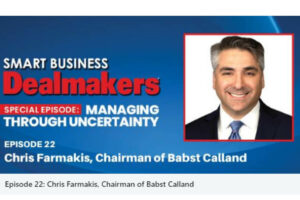
The COVID-19 crisis has revealed numerous legal issues that entrepreneurs and business leaders hadn’t faced before. Christian Farmakis, chairman of Babst Calland explains what c-suite executives should be thinking about, including giving a new level of scrutiny to contracts.
Click here to listen.

Firm to Develop Legal/Commercial Framework for Payload Service for NASA’s Artemis Human Landing System
Babst Calland today announced that under a recently announced NASA award, Astrobotic Technologies, Inc. (Astrobotic) has selected the firm to develop what could become the first-of-its-kind blueprint for commercial payload delivery to space for the Artemis human missions as well as future human-crewed space missions.
Pittsburgh-based Astrobotic will be developing the commercial payload service for Dynetics (a Leidos subsidiary), one of three prime contractors (alongside SpaceX and Blue Origin) selected by NASA to design and build a commercial Human Landing System (HLS) and compete to build a privately-developed system to take the first woman and next man to the lunar surface in 2024 as part of the NASA Artemis program.
Read More.
Artificial intelligence (AI) is adding efficiencies and transforming businesses everywhere, and legal practices are no exception.
General counsels who are hiring lawyers need to understand that this technology is available now, so they can make sure their lawyers are leveraging the latest technology tools. AI can increase speed, increase efficiency and lower costs for clients—if the law firm has the right tools, but more importantly knows how to use those tools.
The following are some of the common questions about advancement of AI technology in the legal space.
Read More.
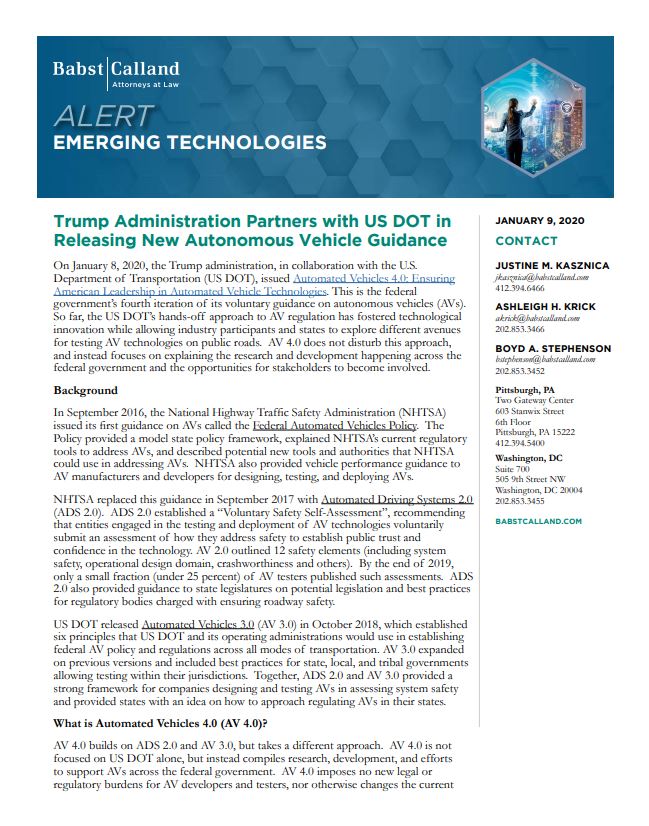 On January 8, 2020, the Trump administration, in collaboration with the U.S. Department of Transportation (US DOT), issued Automated Vehicles 4.0: Ensuring American Leadership in Automated Vehicle Technologies. This is the federal government’s fourth iteration of its voluntary guidance on autonomous vehicles (AVs). So far, the US DOT’s hands-off approach to AV regulation has allowed for technological innovation while allowing industry participants and states to explore different avenues for testing AV technologies on public roads. AV 4.0 does not disturb this approach, and instead focuses on explaining the research and development happening across the federal government and the opportunities for stakeholders to become involved.
On January 8, 2020, the Trump administration, in collaboration with the U.S. Department of Transportation (US DOT), issued Automated Vehicles 4.0: Ensuring American Leadership in Automated Vehicle Technologies. This is the federal government’s fourth iteration of its voluntary guidance on autonomous vehicles (AVs). So far, the US DOT’s hands-off approach to AV regulation has allowed for technological innovation while allowing industry participants and states to explore different avenues for testing AV technologies on public roads. AV 4.0 does not disturb this approach, and instead focuses on explaining the research and development happening across the federal government and the opportunities for stakeholders to become involved.
Read More.

 While Big Pharma is well-poised to incur the expense of patent filing, including the additional expense of paying for accelerated examination of their applications, smaller concerns may not be in a position to do so. To help small businesses and solo inventors in this regard, the United States Patent Office has announced a
While Big Pharma is well-poised to incur the expense of patent filing, including the additional expense of paying for accelerated examination of their applications, smaller concerns may not be in a position to do so. To help small businesses and solo inventors in this regard, the United States Patent Office has announced a  On August 3, 2020, Twitter disclosed in a
On August 3, 2020, Twitter disclosed in a 



